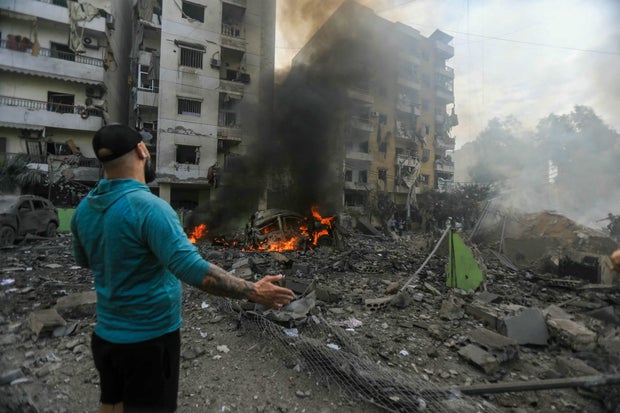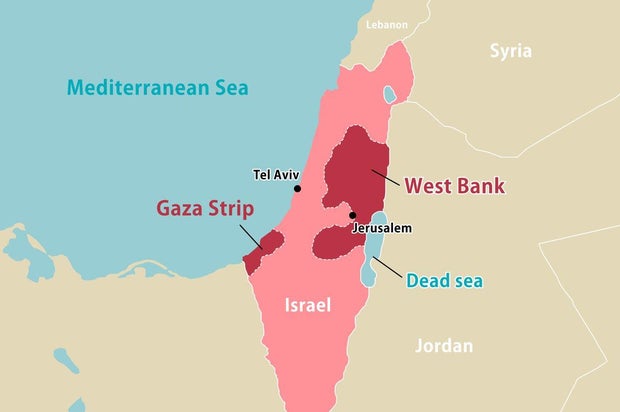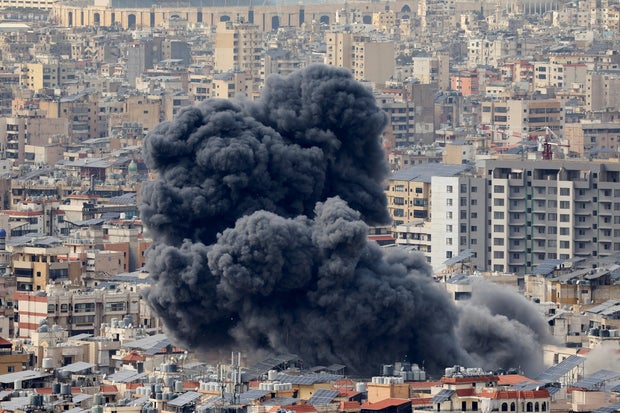Israel bombs Beirut for first time since ceasefire with Hezbollah, as deadly strikes in Gaza continue
Beirut, Lebanon — Israel has launched an attack on the Lebanese capital, Beirut, for the first time since a fragile ceasefire ended the latest Israel-Hezbollah war in November. Associated Press reporters in Beirut heard a loud boom and witnessed smoke rising from the area that Israel’s military had warned it would strike.
The strike came after Israel’s army urgently warned people to evacuate parts of a Beirut suburb, vowing to retaliate against strikes which it said were launched from Lebanon into northern Israel. Israel’s defense minister said Friday that if there was no peace in Israel’s northern communities there would be no peace in Beirut either.
The Israel Defense Forces said the strike in Beirut had targeted a Hezbollah drone storage facility in the Dahiyeh neighborhood, which Israel has long described as a key Hezbollah stronghold. Israel accuses Hezbollah of using civilians as human shields and the IDF noted its advanced warning for people to leave the area on Friday.
AFP/Getty
Hezbollah denied firing the rockets at northern Israel, and accused Israel of seeking a pretext to continue attacking Lebanon.
Lebanon’s government ordered all schools and universities in Beirut’s southern suburb of Hadath to close for the day. Residents were seen fleeing the area in cars and on foot ahead of the strike.
It was the first strike on Beirut since a ceasefire took hold on Nov. 27, 2024, between Israel and Hezbollah, a U.S.- and Israeli-designated terrorist organization that has long been powerful political force in Lebanon, although Israel has struck targets in southern Lebanon almost daily since then.
Hezbollah began launching rockets, drones and missiles into Israel the day after its ally Hamas’ unprecedented Oct. 7, 2023 terrorist attack, which ignited the war in Gaza. The Israel-Hezbollah conflict boiled over into all-out war in September as Israel carried out waves of airstrikes and killed most of the militant group’s senior leaders. The fighting killed over 4,000 people in Lebanon and displaced about 60,000 Israelis who live in communities near the country’s shared border.
Getty/iStockphoto
Israeli forces were supposed to withdraw from all Lebanese territory by late January under the ceasefire deal. The deadline was extended to Feb. 18, but Israel has remained in five locations in Lebanon across from communities in northern Israel. Meanwhile, Israel has carried out dozens of airstrikes on southern and eastern Lebanon, saying it attacked Hezbollah, while continuing drone attacks that have killed several members of the militant group.
Last week, Israeli airstrikes on several locations in Lebanon killed six people.
The United Nations Special Coordinator for Lebanon, Jeanine Hennis-Plasschaert, said the exchange of fire was deeply concerning. “This is a critical period for Lebanon and the wider region,” she said Friday.
The Israeli strikes on Beirut came as Lebanon’s President Joseph Aoun made his first visit to Paris as his country’s leader. He met Friday with President Emmanuel Macron who, following their meeting, called the Israeli strike “unacceptable” and a “violation of the ceasefire” that he argued would “play into the hands of Hezbollah.”
Mohamed Azakir/REUTERS
Aoun called the Friday strike a continuation “of Israel’s violations” of the November ceasefire agreement, which was sponsored by the U.S. and France.
Israel continues bombing Gaza as humanitarian crisis deepens
The escalation comes 11 days after Israel abruptly ended its separate ceasefire agreement with Hamas in Gaza, by launching a surprise wave of strikes that killed hundreds of people in the decimated Palestinian territory.
Earlier this month, Israel halted deliveries of food, fuel, medicine and humanitarian aid to Gaza’s roughly 2 million inhabitants.
Israel has vowed to escalate the war until Hamas returns the 59 hostages it still holds in Gaza — 24 of whom are still believed to be alive. Israel is demanding that Hamas give up power, disarm and send its leaders out of Gaza into exile.
Hamas has said it will only release the remaining captives in exchange for Palestinian prisoners, a lasting ceasefire, and an Israeli withdrawal from Gaza.
The war triggered by Hamas’ terrorist attack has killed more than 50,000 Palestinians in Gaza, many of them women and children, according to the enclave’s Hamas-run Health Ministry. The attack on Israel saw Hamas and its allies kill some 1,200 people, mostly civilians, and take 251 others hostage.
Almost 40 more people were killed in Israeli strikes across the Gaza Strip overnight, Palestinian media outlets said Friday, including 14 who were reportedly killed in a strike that hit a house in the al-Zaytoun neighborhood in Gaza city. The Gaza Health Ministry said Thursday that 855 people had been killed since the resumption of Israeli attacks on March 18. The Hamas-run ministry’s figures do not differentiate between civilian and combatant casualties.
The World Central Kitchen charity said in a social media post that one of its volunteers in Gaza was killed in an Israeli airstrike Thursday that hit near one of its kitchens during a meal distribution.
“Our hearts are heavy today,” the organization, founded by American-Spanish chef José Andrés, said in a social media post, adding that six other people were wounded in the same strike. About a year ago, Andrés accused Israeli forces of “targeting us in a deconflicting zone” in Gaza. The charity acknowledged dismissing some staff in Gaza in December after Israeli authorities provided a list of about 60 WCK volunteers whom it alleged were linked to terrorism.
“This should not be taken as a conclusion by WCK that the individuals are affiliated with any terror organization,” the Washington D.C-based charity said at the time. “Prior to receiving the results of the COGAT [Israeli government] security check, we had no reason for concern regarding any of these individuals and, because Israel does not share intelligence with aid organizations, we do not know the basis for Israel’s decision to flag these individuals. However, we felt this step was necessary to protect our team and operations.”
The United Nations’ World Food Program also sounded alarm Friday over the deepening hunger crisis in Gaza more than two weeks after Israel cut off the flow of most humanitarian aid into the territory, with its director in the region telling the Al Jazeera network that more than 90% of the enclave’s population lacked food security.
According to a report by the U.N.’s Office for the Coordination of Humanitarian Affairs, Israel obstructed 82% of aid convoys intended for Gaza between March 18 and March 24), hampering relief efforts.







